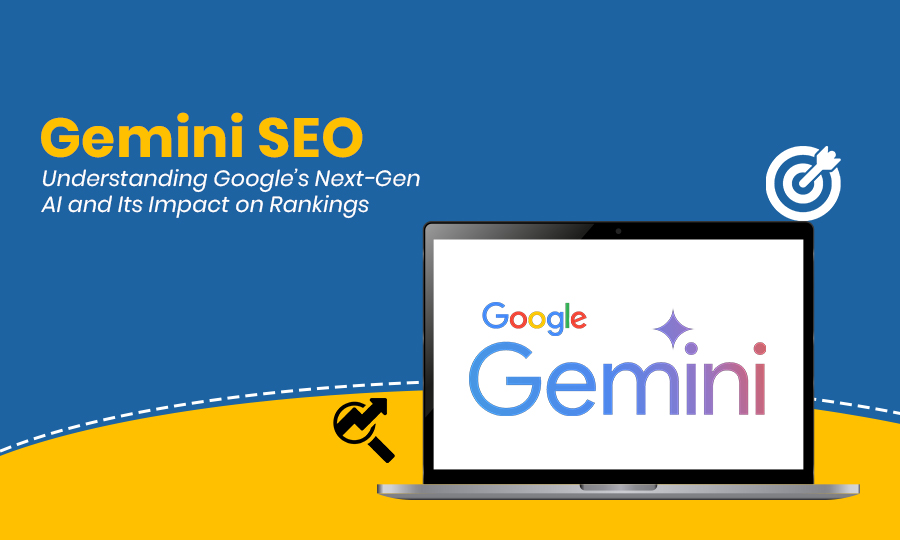The rise of Gemini SEO represents a defining moment in the digital marketing world. This is also important for business owners because their websites need to be optimized for search engines and AI platforms like ChatGPT, Gemini, and Perplexity. Among all these AI search engines, here we talk about how you optimize your website for Gemini to ensure your business stays competitive and visible in the ever-evolving digital landscape.
Google is changing how content ranks, is read, and reaches people with a new wave of search intelligence. Google introduced Gemini AI in December 2023, built by DeepMind, as its most advanced multimodal model capable of processing text, code, images, and even video simultaneously. A recent study found that 65% of businesses have achieved improved SEO results by integrating AI into their strategies.
You don’t have to worry about keyword density or backlink counts anymore since Google released Gemini AI. This breakthrough made Gemini not just an upgrade to Bard but the foundation of an entirely new search ecosystem. 78% of organizations now depend on AI tools to refine their search visibility. It’s clear from these numbers that you need to know how AI reads your content if you want to stay ahead in search results.
So, whether you are a startup or a giant business owner, if you want your website to be listed on Gemini AI, then you have to prepare your content and website. That’s why you should implement Gemini SEO strategies into your online marketing approaches.
In this article, you will learn a deeper understanding of Gemini and Google Overviews, their importance for your brand’s online exposure, and how to create content and develop them for featured snippets and make them mobile-friendly. Furthermore, how do you maintain technical SEO and off-page SEO for Gemini? All necessary factors and their implementation steps will be covered.
Let’s Understand Gemini & Google AI Overviews
Google Gemini is the AI brain; AI Overviews is one of its visible superpowers. Google’s Gemini app is now available in over 150 countries and territories. However, some regions, including the EU and UK, were initially excluded from certain Gemini mobile app functions.
What is Google Gemini?
Gemini = Google’s Next-Gen AI model (like OpenAI’s GPT or Anthropic’s Claude). Moreover, you can think of Gemini as the engine the technology that understands language, context, visuals, and meaning.
- As of now, Google Gemini is the company’s most advanced AI model. It powers modern search engines with advanced multimodal understanding.
- Gemini replaced Bard (Google’s earlier chatbot) and became the foundation for Google’s entire AI ecosystem including Search, YouTube, Gmail, Docs, and Android.
- When you use Gemini in Google Search, it looks at text, images, and videos all at the same time to figure out what you’re looking for. It can go beyond simple keyword research, focus on actual search intent.
- Search engines can understand complicated search queries and give users Google AI Overviews that directly answer their questions with this Gemini AI technology. Gemini looks at existing content in a more strategic way than traditional SEO programs.
How Gemini Differs from Previous Google Algorithms?
Before we enter the strategies of SEO for Gemini, you need to understand why Gemini is different from other Google algorithms. The biggest change to how search works since Rank Brain and BERT came out is now happening with Google Gemini. Google has been working to improve its algorithms for more than ten years so that they can better understand language, user intent, and the quality of content. But Gemini SEO introduces something entirely new AI system that not only reads your content but reasons with it.
| Previous Algorithm | Launch Year | Main Goal | Gemini’s Advantage |
| Panda | 2011 | Improve content quality, fight duplication | Evaluates accuracy, depth, and factual reliability |
| Penguin | 2012 | Penalize manipulative backlinks | Focuses on topical authority and trusted link relevance |
| Hummingbird | 2013 | Understand the meaning behind search queries | Processes full intent across multiple formats |
| RankBrain | 2015 | Add machine learning to interpret queries | Uses deep reasoning and contextual intelligence |
| BERT | 2019 | Understand context in sentences | Reads complete meaning, tone, and emotion |
| MUM | 2021 | Relate data across languages and media | Fully multimodal understanding — text, image, video |
Now, Gemini takes all these abilities to a higher level. It doesn’t just analyze words—it evaluates meaning, tone, visuals, and intent at once. It can understand not only what a page says, but why it says it, and whether it truly satisfies the user’s need.
The difference is simple but revolutionary — earlier algorithms analyzed signals, but Gemini interprets intelligence.
For SEO, this means the focus shifts from keyword tricks to authentic, context-rich, and AI-readable content. Those who master Gemini SEO will be able to rank not just for search results, but also in AI Overviews, featured snippets, and the new intelligent layers of Google Search.
The Role of Large Language Models in Modern Search Engines
- Google Gemini interprets the meaning of billions of search queries every day using big language models. These models enable search engines to generate AI Overviews by combining information from multiple sources while maintaining Google Business Profile integration for local searches.
- Content marketers must leverage Gemini AI’s search intent understanding with natural language, structured data, and topical authority. The Gemini AI infrastructure processes organic traffic patterns to refine how Google Search presents results.
- Moreover, it can enhance content discoverability by optimizing for featured snippets and knowledge panels. It will ultimately improve visibility and click-through rates.
What Are Google AI Overviews?
Google AI Overviews is a search feature that shows AI-generated summaries at the top of Google Search results. Gemini powers it, but it’s just one of the many applications of Gemini’s intelligence. Moreover, AI Overviews collects key points from different websites to give users quick, concise answers.
You can understand more in-depth with this short example-
When you search “best lipsticks,” instead of only listing links, Google might show an AI Overview a short, summarized answer combining information from multiple sources. If your website is well optimized and you have the most authentic content backed by a reliable source, your website link will be present like this-
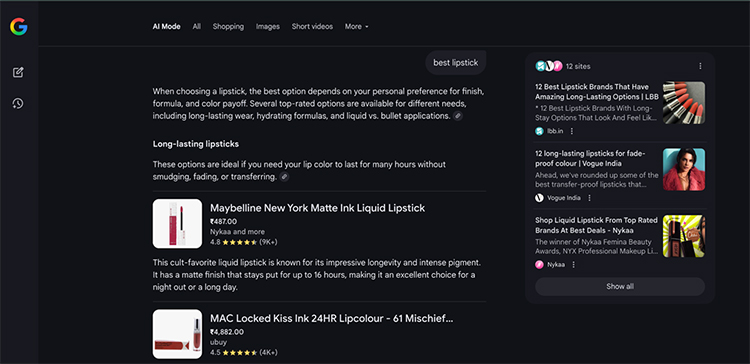
Relationship Between Gemini and Google AI Overviews
- AI Overviews = What users see in Search.
- Gemini = The AI system that creates that overview.
| Aspect | Google Gemini | Google AI Overviews |
| Type | AI model/technology | Search feature |
| Role | Processes and understands content | Displays summarized answers |
| Launched | December 2023 | May 2024 (SGE → renamed to AI Overviews) |
| Connection | Powers AI Overviews | Runs on Gemini’s intelligence |
What is Gemini SEO & Why is it Important?
Gemini SEO makes content readable, reliable, and cited by Google’s Gemini, an advanced multimodal AI model that runs options like AI Overviews. It depends on how AI reads, connects, and organizes your content for users.
When traditional SEO only focused on link rankings, Gemini SEO tries to get your content featured directly in the AI-generated answers. This will increase your brand’s visibility and establish it as a reliable source.
If you optimize your website perfectly for Gemini. Your website link will be shown on the Gemini interface like this-
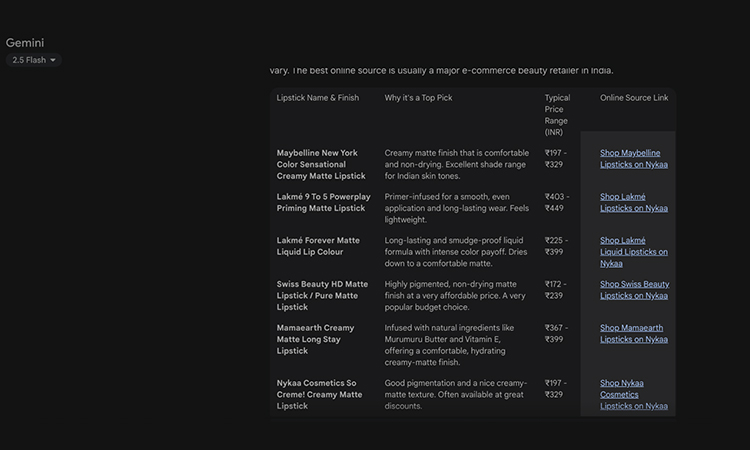
The Importance of Gemini SEO Strategies
As search engines switch to AI, Gemini SEO becomes more important and changes the way people find information.
- Google has rolled out and tested AI-only search modes and AI Overviews (powered by Gemini) that provide summarized answers with links to sources. When a source link is included in the summary, even AI-first interfaces are more likely to get clicks. The links in AI Overviews usually get a lot of clicks for specific queries because the user is more interested.
- Recent research shows AI summaries now appear in a large share of searches. Where a summary appears, users click standard links less often so being the cited source in an AI Overview both raises brand visibility and frequently drives high-value clicks.
- As compared to pages without summaries, pages with summaries got fewer clicks on regular result links. There is a chance that people will recognize your brand even if they don’t click on anything in the AI Overview.
Complete Gemini SEO Strategy: From Keyword Research to Technical Guidance
Here, you will explore all the important steps for Gemini SEO. You will learn how to find keywords, then how you implement them into your content and how featured snippets and schema markup can be added. Moreover, the important strategy for technical SEO and Off page SEO to improve Gemini search engine optimization strategies. So, let’s take a tour of Gemini SEO Guide.
- Keyword Research for Gemini Era: Target Long-Tail + Conversational Queries
Keywords are those specific search terms that your target audience uses to find your products or services. There are various ways to find out those terms. In this segment, you will learn all the necessary steps of keyword research for Gemini SEO.
What Types of Keywords Does Gemini AI Prioritize?
The Google Gemini AI knows more than just words. Gemini’s search algorithm is different from past ones that focused on exact-match terms. It looks at semantic meaning, or the “why” behind a question.
It gives natural, conversational, question-based keywords more weight.
- Shift from Exact Match to Semantic Search: Gemini reads context. Instead of ranking for “best keyword research tool,” it prefers phrases like “what is the best keyword research tool for beginners?” or “how can I use target keywords to rank faster?”
- Long-Tail & Conversational Queries Matter: Long-tail keywords match how people talk to AI (like Ask Gemini or Google Assistant). These frequently have lower competition and higher conversion potential.
- Question-Based Queries: Questions like “How does Gemini AI impact SEO rankings?” or “Which AI tool helps improve Google visibility?” align perfectly with AI Overviews and featured snippet opportunities.
Step-by-Step Gemini Keyword Research Strategy:
- Understand Search Intent: You need to identify whether users want to be informational, buy (transactional), or compare (navigational). Gemini prioritizes intent-matched answers.
- Use AI Keyword Tools:
- Google Keyword Planner → baseline search data
- Surfer SEO → AI relevance scoring
- AnswerThePublic → conversational queries
- Also Asked → real user questions
- ChatGPT + Gemini → semantic keyword expansion
- Build Topic Clusters: Group keywords by theme (e.g., “Best laptops for programming,” “Laptop comparison: Dell vs HP vs Lenovo”). Each cluster should link internally to build authority.
- Focus on E-E-A-T Topics: Gemini promotes expert, trustworthy, and helpful content. Choose keywords that support your authority in your niche.
- Optimize for Questions & Context: Then you should create headings using “What,” “How,” “Why,” etc. This helps Gemini understand your structure and highlight your content in AI summaries.
- Monitor AI Ranking Signals: You can use Google Search Console, Surfer Audit, or Ahrefs to track visibility in AI Overviews and zero-click results.
Let’s dig deeper into the more practical keyword research with specific tools-
Here, I am using the Answer the public keyword tool to find out keywords according to your services or products.
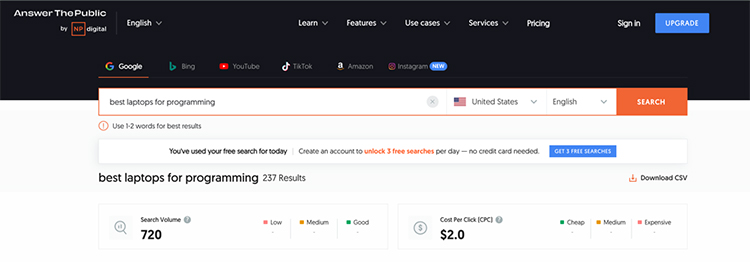
What is Search Volume in terms of Keyword Findings?
Search Volume means how many times people search for a keyword in a month.
- Example: “Best laptop for students” = 10,000 searches/month. It shows how popular that keyword is.
High volume = more traffic, but also more competition.
Low volume = less traffic, but it can be easier to rank.
Gemini SEO Tip: You need to choose a mix of medium-volume and long-tail keywords (like “best budget laptop for online classes”) — these are easier for Google Gemini to understand and feature in AI results.
What Is KD (Keyword Difficulty)?
Keyword Difficulty measures how hard it is to rank for a keyword on Google shown as a percentage or score (0–100).
- Low KD (0–30): Easier to rank
- Medium KD (31–70): Moderate competition
- High KD (71–100): Very competitive
Gemini SEO Tip: For new sites, focus on KD below 40 to build early visibility and authority faster.
What Is CPC (Cost Per Click)?
CPC tells how much advertisers pay when someone clicks an ad for that keyword.
- Example: “Buy gaming laptop online” CPC = ₹45
It shows commercial intent — high CPC = profitable keyword (users want to buy).
Gemini SEO Tip: Then you can use high-CPC keywords in your product or service pages, not blogs. Gemini recognizes them as high-intent search terms.
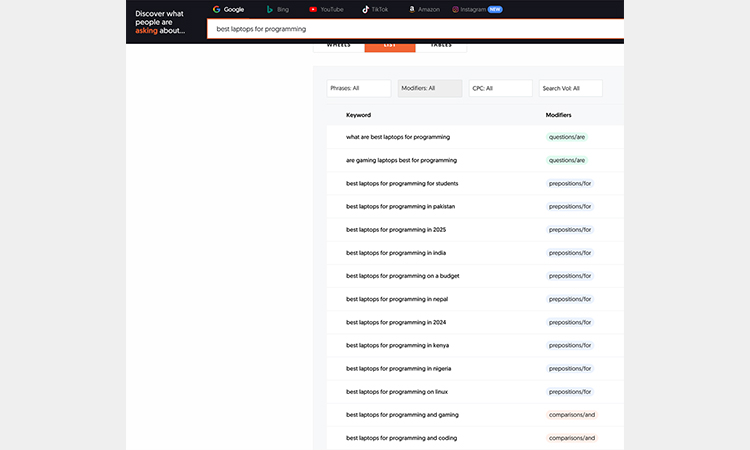
You can find top keywords in the People Also Ask section from the Answer The Public tool. Like this-
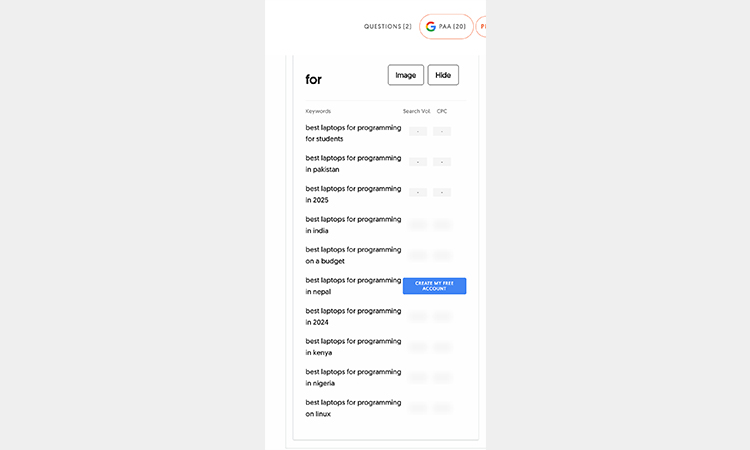
Moreover, you can find more related keywords to put variety in content.

However, you can use AI tools like Gemini and ChatGPT to find more semantic words for your target keywords.
You can write “Create a Topic Cluster for a Laptop Company”, then ChatGPT will show you this-
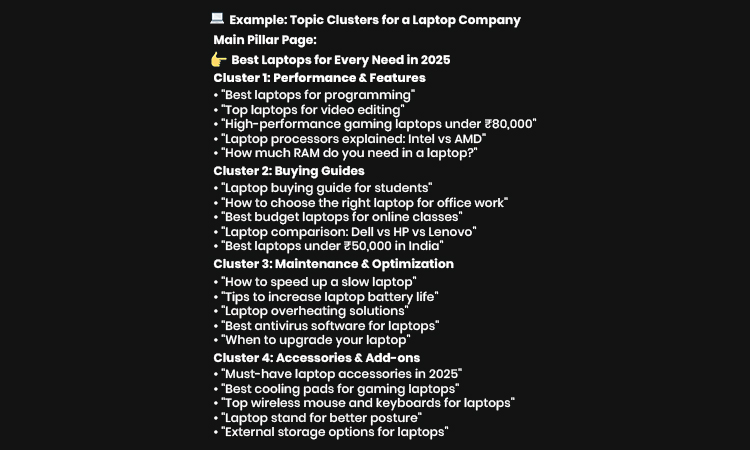
Then you can try it on Gemini itself to find related keywords. You can ask the same question on Gemini that –
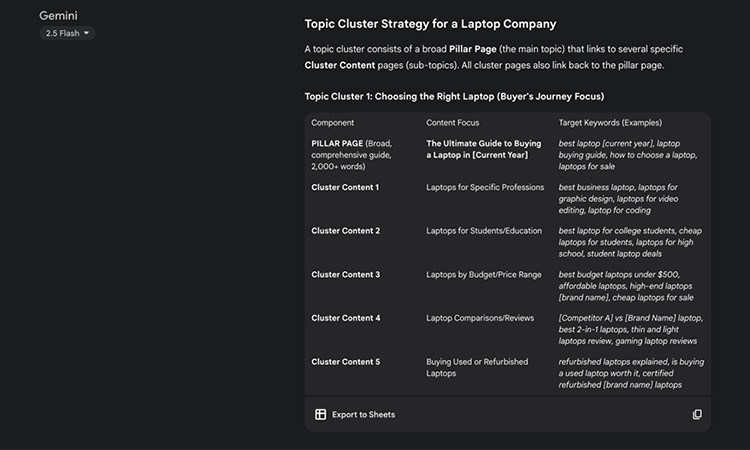
You can use the “Export to Sheets”.It creates through keyword list on a Google Excel sheet. It will be very beneficial to develop your own content strategy.

You can find your perfect keywords and improve your content for better visibility.
- Content Marketing Techniques for Gemini SEO Program
Gemini content marketing involves developing, releasing, and optimizing useful, applicable, and AI-friendly content that matches Google Gemini’s information retrieval. Gemini SEO focuses on context, intent, and helpfulness — three pillars that shape how content is discovered and ranked in the AI-driven search era. It reads beyond surface-level keywords and focuses on semantic meaning, topic depth, and user satisfaction. Let’s explore in detail how you can optimize content for Gemini.
How Can You Create Content That Gemini AI Will Cite?
- Logical Hierarchy and Clear Organization- Gemini AI can figure out what people are looking for and give them correct answers with this logical flow.
- Google Gemini processes high-quality content through organized layers that make information easily accessible.
- Your content creation strategy should start with a clear outline where main topics connect logically to subtopics.
- Your audience will benefit when you organize data from big ideas to specifics. Ask Gemini to analyze successful articles in your niche, and you’ll notice regular patterns in how top-ranking content structures information.
- E-E-A-T Principles (Experience, Expertise, Authoritativeness, Trustworthiness)- When you decide what to include in AI overviews, Google Gemini uses the E-E-A-T method to evaluate content.
- Your high-quality content must demonstrate real-world experience through case studies and practical examples.
- Teach your audience that you know a lot about difficult topics by making them easy to understand. Build authoritativeness with external citations and industry recognition.
- You can build a reputation with truthful information and open sourcing. When you leverage Gemini for content marketing, this framework ensures your material meets the standards that drive organic traffic and AI citations.
- Question-and-Answer Format Optimization
- As Google Gemini users, we know that question-based content formats work great with the tool. When you leverage Gemini for content marketing, construct your articles around unique questions your target audience asks. This approach helps Google Gemini understand search intent immediately and provides concise answers that AI overviews can cite.
- For Google Gemini, high-quality content includes short, memorable insights that are easy for AI systems to pull out. These quotable sections increase your visibility in AI overviews because Gemini AI can quickly identify and cite your most valuable contributions.
- In the first few sentences of the content you write, you should use H2 and H3 tags that are formatted as questions. This structure increases organic traffic because it matches natural user intent patterns that Google Gemini perceives.
- Moreover, your content creation plan should include things like surveys, case studies, or private data that Google Gemini can’t find anywhere else. You’ll see that unique statistics and findings are cited when you use Gemini to look at your competitors.
- Multi-Format Content (Text, Images, Video, Data)
- High-quality content for Gemini AI extends beyond text to include visual elements that enhance understanding.
- Your content marketing strategy should integrate infographics, comparison tables, charts, and embedded videos that explain complex topics.
- When you ask Gemini about successful content patterns, it favors pages offering comprehensive multi-format information.
- You can help Gemini AI understand the full purpose of your content by using images with alt text that describes them, videos with transcripts, and data graphic representations. This makes your content more visible in AI overviews.
- Comprehensive Topic Coverage
- More than surface-level content, Google Gemini likes articles that go into great detail about what the user wants.
- Your content marketing should feature bold statements, actionable tips, and clear conclusions that answer specific user intent.
- Your content creation should cover related subtopics, answer follow-up questions, and provide context that helps users understand the complete picture. This depth signals to Gemini AI that your content deserves citation in AI overviews.
- You’ll find that top-cited sources consistently give more in-depth coverage than competitors when you use Gemini for research, which leads to more organic traffic.
- Authority Building and Credibility Signals
- Google Gemini gives preference to content that shows a particular level of expertise when creating AI summaries. Your high-quality content must include author bios highlighting credentials, professional experience, and subject matter expertise.
- Ask Gemini about successful authority signals, and it will emphasize the importance of displaying certifications, awards, and professional affiliations.
- When you understand search intent, you realize users trust content from established experts, which is why Gemini AI favors authoritative sources that build user confidence and drive organic traffic.
- Internal Linking and Content Relationships
- Strong internal linking structures help Google Gemini understand relationships between your content pieces.
- Through contextual links that lead both humans and AI systems through your knowledge ecosystem, your content marketing strategy should link articles that are related to each other. The more often Gemini AI cites your content in AI overviews, the better it understands your topical authority.
- This will keep your audience on your site longer, which will lower the number of people who leave right away and bring you more organic traffic.
What Role Does Content Readability Play in Gemini AI Rankings?
- The readability of your content directly affects how Google Gemini interprets and references it in AI summaries. Your high-quality content needs short paragraphs, clear subheadings, and visual breaks that help both human readers and AI systems extract key information quickly.
- Your content marketing should target a reading level between grades 8 and 10, making information understandable without oversimplifying complex topics. When you leverage Gemini for audience research, you’ll find that simple language increases engagement across demographics. This accessibility helps Gemini AI confidently cite your content’s readability.
- Your content creation should use bullet points for lists, numbered steps for processes, and bold text for key concepts. However, you can ask Gemini about formatting best practices, and it emphasizes the importance of white space, short sentences, and transitional phrases. These techniques improve how quickly your target audience absorbs information, which Google Gemini recognizes when selecting content for AI overviews.
How to Check Content Readability: Best Practices with Best Tools
Here, I can give you some tools to improve content readability. If you optimize content with these tools, you can improve your content for Gemini.
- You can use Hemingway Editor for Quick Readability Assessment.
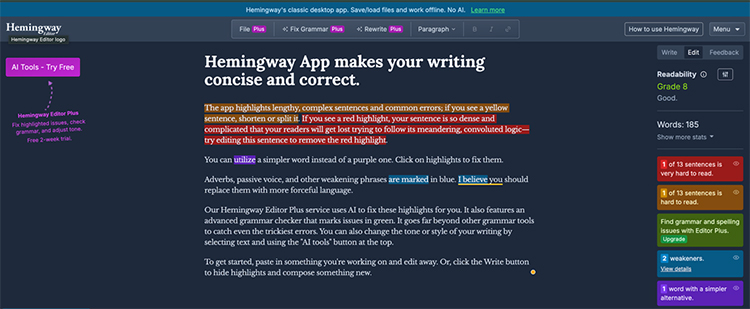
- Hemingway Editor highlights difficult sentences and suggests simpler ones to give you immediate feedback on how readable the content is. Copy your high-quality content into the free online tool of Hemingway.
- The tool assigns a grade level score aim for grade 6-8 for Google Gemini optimization.
- Hard-to-read sentences are highlighted in yellow, and extremely challenging passages are highlighted in red.
- When you ask Gemini about readability tools, Hemingway consistently ranks as the top choice for immediate improvements that enhance AI overview visibility.
- Analyze with Grammarly for Comprehensive Quality Checks
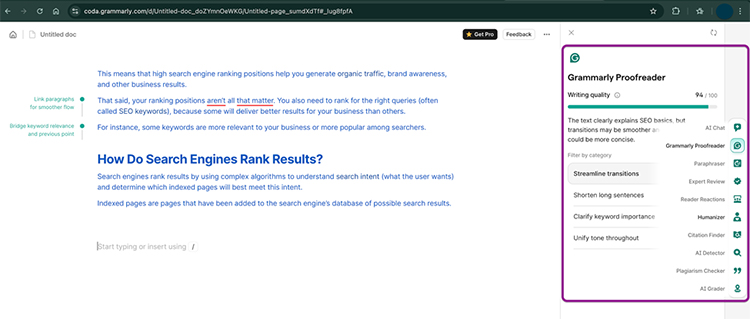
Grammarly does more than just check grammar; it also assesses engagement, tone, and readability.
Install the browser extension or use the web editor to analyze your content marketing materials. The tool provides a Flesch Reading Ease score target 60-70 for optimal Gemini AI processing. Grammarly identifies wordy sentences, passive voice, and unclear phrases that could prevent Google Gemini from citing your content.
When you leverage Gemini alongside Grammarly, you create high-quality content that meets both user intent and AI overview requirements, increasing organic traffic.
- Implement Yoast SEO for WordPress Content Optimization
- Readability analysis is a feature of the Yoast SEO plugin that is specifically made for WordPress content creation.
- Install the plugin and scroll to the readability tab below your post editor.
- Green indicators indicate passing scores, while orange and red indicators highlight areas that need improvement.
- The tool checks paragraph length, sentence length, subheading distribution, and transition words—all factors Google Gemini considers when selecting content for AI overviews.
- This integration helps your target audience find well-optimized content that drives organic traffic.
- Optimize Specifically for Gemini with Structured Content
- Google Gemini likes content with clear question-answer pairs, logical structures, and brief overviews.
- Moreover, you can structure your high-quality content with introductory summaries that provide immediate value. Use FAQ sections that directly address common search queries.
- Add schema markup using Google’s Structured Data Markup Helper to help Gemini AI understand your content relationships.
- When you ask Gemini about effective content patterns, it suggests these structural components that maximize your AI overview citations and make information extraction simple.
- How Does Schema Markup Help Gemini AI Understand Content?
A form of code called schema markup is added to your website to improve the way search engines, such as Google Gemini, comprehend your content. It gives extra details about your pages — such as articles, reviews, or FAQs that enhance how your site appears in search results. In Gemini SEO, schema markup is essential for improving the usefulness and machine-readable nature of your content, which raises the likelihood that it will show up in AI Overviews and featured snippets.
How Does Schema Markup Help Gemini AI Understand Content?
Schema serves as a translator between the AI system of Google Gemini and your content. Gemini can better figure out what your page is about, which makes it more likely that your site will show up in search results. A well-structured schema makes your content more likely to get citations or enhanced visibility.
Most relevant schema types for Gemini SEO include:
- FAQ schema: It gives queries based on questions and conversational search.
- Article and Blog Schema: This is long-form, informative content.
- Product, Review, and Local Business schema: For business-related or eCommerce sites.
- HowTo and Q&A schema: step-by-step and instructional content.
How Can You Implement Schema Markup Effectively?
- Choose Schema Type: First, you need to connect the schema to your content type (FAQ, article, etc.).
- Add JSON-LD Code: Insert schema code in your page’s HTML before you publish.
- Use Tools: Add markup using tools like Google’s Structured Data Markup Helper or plugins like Rank Math or Yoast.
- Validate: Test your schema with Google’s Rich Results Test tool.
- Monitor: Recheck regularly to ensure updates match Gemini SEO changes.
- How Do Featured Snippets Work Within the Gemini AI Ecosystem?
Google’s Gemini AI ecosystem has information cards called “featured snippets” that are enhanced by AI. It will show up high in search results to quickly answer users’ questions.
How They Work
- Gemini AI analyzes webpage content to identify the most relevant answers for specific queries.
- To choose the best snippets for search intent, the system looks at data structure, relevance, and quality.
- Gemini can put together information from different sources and give responses that make sense in their context.
How to Implement Featured Snippets?
- Structure Content Clearly—You need to implement header tags (H2, H3) to arrange information hierarchically. Then break content into scannable sections with clear subtopics.
- Answer Questions Directly—Then you can start paragraphs with concise answers to common questions. Place the most valuable information in the first 40-60 words.
- Put lists and tables to use—You can make how-to tips look nice by using numbered lists. Incorporate tables to show similarities. For snippet selection, Gemini gives more weight to well-structured data.
- Optimize for Question Phrases—Include “what is,” “how to,” and “why does” concepts naturally. You should target long-tail keywords matching user search queries. This will help your content appear in featured snippets.
- Implement Schema Markup– Add structured data (FAQ, how-to, and article schema) to help Gemini understand your content’s context and purpose.
- Create Comprehensive Definitions—Provide clear, concise definitions within 50-60 words for key terms in your niche.
- Focus on Quality and Authority—Build topical authority through comprehensive coverage. Earn backlinks and maintain high-quality standards to signal trustworthiness.
- Mobile Optimization- Ensure fast loading speeds and mobile-responsive design, as Gemini prioritizes user experience.
- Monitor Performance– Moreover, you can take help from using Google Search Console to track snippet appearances and optimize underperforming content accordingly.
- Why Is Google Business Profile Optimization Essential for Gemini AI?
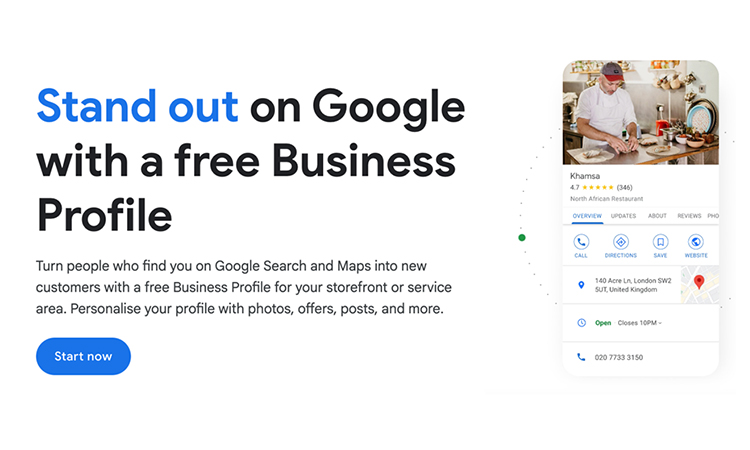
Gemini AI integration needs to optimize the Google Business Profile (GBP) because it has a direct effect on how AI-powered search engines show users local search results and business information.
Why Google Business Profile Optimization Matters for the Gemini SEO Program?
- Enhanced AI Understanding—Gemini AI mines and analyzes Google Business Profile data to learn about your company’s offerings, location, and services. Search engines use optimized profiles to more precisely classify and suggest your company for pertinent queries.
- Better Visibility in AI Responses—Gemini provides better visibility than traditional websites. AI-generated responses prominently display optimized Google Business Profile listings, so users are left to ask about local services alone.
- Semantic Search Integration: Search engine optimization is essential for showing up in conversational AI searches because Gemini matches businesses with user intent using relevant keywords and contextual data from your Google Business Profile.
Implementation Steps for Gemini-Ready Google Business Profile
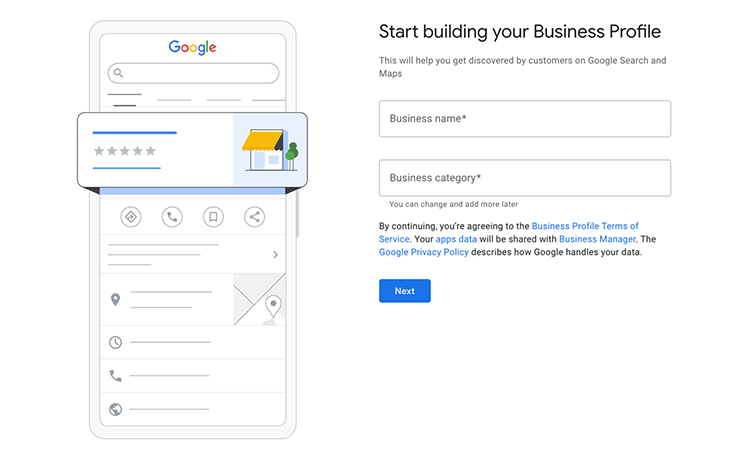
- Complete Every Section- Fill all Google Business Profile fields: business name, category, services, hours, and qualities. Gemini AI prioritizes complete profiles over partial ones.
- Use Related Keywords Naturally—You should incorporate service-related keywords in your business description and services section. Avoid keyword stuffing; focus on natural language that search engines can understand.
- Optimize for Local Intent—Involve location-specific terms and service areas. Gemini AI uses this data to match local queries with relevant businesses.
- Add High-Quality Images—Then you should upload photos of your services, products, and location. Search engines use visual content to enhance ranking signals and confirm legitimacy.
- Collect and Respond to Reviews—Active engagement signals business credibility to Gemini AI. Respond professionally to all reviews using related keywords naturally.
- Post Regular Updates—Share offers, news, and events through GBP posts. Fresh content signals active business operations to search engines.
- Ensure NAP Consistency—Match your name, address, and phone number across websites and directories. Consistency helps Gemini AI verify and trust your business information.
- Link Your Website—Connect your optimized website for additional context and authority signals that enhance overall visibility in AI-powered results.
- What Off-Page SEO Factors Matter for Gemini SEO?
A comprehensive strategy centered on genuine authority building is needed for the off-page SEO strategy for Gemini. You can use these ideas, and by working hard on them consistently across multiple platforms, you can create a strong off-page foundation. Remember, Gemini AI rewards genuine helpful signals over manipulative tactics, making authentic relationship building the ultimate game changer for long-term success.
Steps to Optimize Off-Page SEO for Gemini
You can follow the steps to improve your Gemini SEO strategy-
Step 1: Build Strategic Partnerships- You need to link up with authoritative websites in your niche. Guest posting on reputable platforms creates helpful backlinks while positioning you as an industry expert. Focus on quality over quantity—one link from an authoritative source outweighs dozens from low-quality sites. High-Quality Backlinks Backlinks remain fundamental, but Gemini AI assesses link quality more accurately.
Step 2: Create Link-Worthy Content- Then you can develop interesting resources like original research, comprehensive guides, or unique data graphics. This game-changer approach naturally attracts backlinks as others reference your profitable content.
Step 3: You can take help from Digital PR- Furthermore, you can earn media coverage through newsworthy stories, expert commentary, or innovative ideas. Press mentions from reliable sources make Gemini think a lot more highly of your authority.
Step 4: Optimize Your Social Presence- Make the most of your social presence by keeping your pages up to date on the right social networks. Share useful information, interact with your audience, and help people get to know each other. Gemini can figure out how far and how much your brand matters by keeping up with social media activity.
Step 5: Encourage Brand Mentions- Thereafter, you can establish plans to get more brand comments that aren’t related to anything else. Offer excellent service, make material that people will want to share, and take part in talks about your business. These comments help Gemini AI figure out if something is true.
Step 6: Build Local Citations- For local companies, their NAP (Name, Address, Phone) information must be the same in all listings. Gemini uses these signs to make sure that a business is real and relevant in the area.
Step 7: Engage in Community Building- Be honest when you post in boards, Q&A sites (like Quora and Reddit), and business communities. Don’t directly promote your site when you share useful information. This shows that you are an expert and leads to natural references.
Step 8: Monitor and Analyze Competitors- You can study where competitors earn backlinks and mentions. Identify interesting opportunities and create better content to capture similar links. Use tools to track your backlink profile growth. You can use the following tools to monitor off-page Gemini SEO strategy-
- Semrush-All-in-one platform offering backlink audits, brand monitoring, and competitor analysis. The Link Building Tool helps identify prospects and track outreach campaigns.
- Moz Link Explorer– It provides domain authority metrics and link quality assessments. Helpful for understanding which links provide the most value to your site.
- BuzzSumo-You can identify trending content and key influencers in your niche. Perfect for discovering what resonates with audiences and planning outreach strategies.
- Google Alerts– This is a free tool for monitoring brand mentions across the web. Set up alerts to track when your site or brand is mentioned online.
- Majestic SEO– It specializes in backlink analysis with unique metrics like Trust Flow and Citation Flow. They provide helpful information on link quality.
- Brand24-Social listening platform that tracks mentions across social media and the web. Essential for reputation management and identifying engagement opportunities.
Step 9: Foster User-Generated Content—You can invite customers to create reviews, testimonials, and case studies. Gemini really values real signals that come from user-generated content.
Step 10: Maintain Content Freshness—Furthermore, you need to regularly update external content and guest posts. Fresh, relevant contributions signal ongoing expertise and keep your site relevant in Gemini’s assessment.
- What Technical Elements Enhance Content for Gemini SEO?
Technical SEO is what makes it possible for Gemini AI to find, understand, and rank your content correctly. For Gemini AI to process and recommend content correctly, it needs better technical infrastructure than traditional search engines. Let’s explore essential technical elements and their implementation.
Improve Site Performance to be cited on Gemini
How fast your website loads and responds to user actions is called site performance. According to Gemini SEO, performance has a direct effect on how AI crawlers access and judge your content. Poor user experiences make slow sites less important in Gemini’s evaluation, which goes against Gemini’s goal of suggesting helpful, easy-to-find content.
Implementation Steps:
- Use Google PageSpeed Insights to identify performance bottlenecks.
- Compress images using WebP format and lazy loading.
- Limit CSS, JavaScript, and HTML files.
- Set up browser caching for returning visitors.
- Use a Content Delivery Network (CDN) for faster global access.
- Reduce server response time to under 200 ms.
Indexability and Crawlability
Search engines can add your pages to their index if they are indexable, and they can access and scan your content if they are crawlable. These parts are important for Gemini SEO because AI systems need to find and understand your content first before recommending it to recommend.
Implementation Steps:
- Check that all important pages are accessible within 3 clicks from the homepage.
- Eradicate unnecessary parameters that create duplicate URLs.
- Adopt internal linking to connect related content.
- Avoid orphan pages with no internal links.
- Monitor Google Search Console for crawl issues.
- Use “noindex” only for truly nonvaluable pages.
Clean Site Architecture & Breadcrumb Navigation
Site architecture is how your website is organized, and breadcrumbs help people find their way around that structure. Gemini AI uses clean architecture to understand content relationships and context. Well-structured sites help AI categorize content accurately, improving recommendation accuracy. Breadcrumbs provide semantic signals that help Gemini understand your site’s topical organization.
Implementation Steps:
- Create logical category hierarchies (Home > Category > Subcategory > Page).
- Implement breadcrumb schema markup using BreadcrumbList.
- Keep the URL structure simple and descriptive.
- Limit site depth to 3-4 levels maximum.
- Use descriptive anchor text in navigation menus.
- Create an HTML sitemap for users.
Mobile-Friendliness
Mobile-friendliness ensures your website functions optimally on smartphones and tablets. Gemini AI prioritizes mobile-optimized content because most users access information via mobile devices. While Google’s mobile-first indexing approach is used, Gemini’s algorithm hits sites that fail mobile-friendliness tests by lowering their ranking significantly.
Implementation Steps:
- Use a responsive design that adapts to all screen sizes.
- Test with Google’s Mobile-Friendly Test tool.
- Ensure text is readable without zooming (minimum 16px font).
- Make buttons and links easily tappable (48×48 pixels minimum).
- Avoid Flash and other unsupported technologies.
- Optimize images for mobile bandwidth.
Page Speed Optimization (Core Web Vitals)
Core Web Vitals checks how fast a website loads (LCP), how interactive it is (FID/INP), and how stable it looks (CLS). For Gemini SEO, these metrics directly influence rankings because they quantify user experience. Gemini AI heavily weights these signals when determining which content provides the best experience, making Core Web Vitals optimization non-negotiable.
Implementation Steps:
- Achieve LCP under 2.5 seconds by optimizing the largest content element.
- Improve FID/INP below 100 ms through JavaScript optimization.
- Maintain CLS under 0.1 by reserving space for dynamic content.
- Eliminate render-blocking resources.
- Preload critical resources like fonts and hero images.
- Monitor metrics regularly through Google Search Console.
SSL Certificate (HTTPS)
HTTPS in URLs means that SSL certificates encrypt data sent between users and your server. Gemini AI treats HTTPS as a baseline security requirement and trust signal. Non-secure HTTP sites are affected in rankings and flagged as unsafe, severely damaging credibility. For Gemini SEO, HTTPS is mandatory for establishing authority and trustworthiness.
Implementation Steps:
- Purchase an SSL certificate from a reputable provider (or use the free Let’s Encrypt).
- Install the certificate on your web server.
- Update all internal links to HTTPS versions.
- Implement 301 redirects from HTTP to HTTPS.
- Update external links and CDN references to HTTPS.
- Submit the HTTPS version to Google Search Console.
XML Sitemap Submission
XML sitemaps list all important pages on your website in a machine-readable format. For Gemini AI, sitemaps accelerate content discovery and ensure comprehensive crawling. They’re especially crucial for large sites or frequently updated content, helping Gemini understand your content priorities and update frequency patterns.
Implementation Steps:
- Generate an XML sitemap using plugins (Yoast, RankMath) or tools.
- Include only indexable, valuable pages (exclude admin and thank-you pages).
- Submit the sitemap through Google Search Console.
- Add sitemap location to robots.txt file.
- Update the sitemap automatically when publishing new content.
- Create separate sitemaps for different content types (posts, pages, images).
Robots.txt Optimization
Robots.txt files instruct search engine crawlers which pages to access or ignore. For Gemini SEO, proper robots.txt configuration prevents wasted crawl budget on irrelevant pages while ensuring important content remains accessible. A misconfigured robots.txt can accidentally block critical content from Gemini’s index.
Implementation Steps:
- Create a robots.txt file in the root directory (yoursite.com/robots.txt).
- Allow access to important content and CSS/JavaScript files.
- Disallow admin areas, duplicate content, and private sections.
- Include sitemap location reference.
- Test using Google’s robots.txt Tester tool.
- Regularly audit to ensure no critical pages are blocked.
Fixing Crawl Errors
Crawl errors occur when search engines cannot access requested pages (404s, server errors, redirects). For Gemini AI, these mistakes make it harder to understand the material and lose crawl resources.
Implementation Steps:
- Monitor Google Search Console’s Coverage report weekly.
- Fix 404 errors by restoring content or implementing 301 redirects.
- Resolve server errors (5xx) by checking the hosting infrastructure.
- Correct redirect chains to single-hop redirects.
- Update internal links pointing to error pages.
- Remove or update broken external links.
Canonical Tags
Canonical tags specify the preferred version of duplicate or similar pages. Gemini AI uses canonicals to group ranking signals and avoid duplicate content confusion. Gemini could split authority between duplicate pages or show the wrong version if you don’t do canonicalization right, which would hurt your SEO efforts.
Implementation Steps:
- Add self-referencing canonical tags to all pages.
- Point duplicate content variations to the preferred URL.
- Use absolute URLs in canonical tags (include https://).
- Ensure canonical tags match HTTP/HTTPS and www/non-www preferences.
- Avoid canonical chains pointing to other canonical URLs.
- Verify canonical implementation using browser developer tools or SEO crawlers.
Frequently Asked Questions
Google did not completely get rid of Gemini. Instead, it changed the name of some of its features and added them to other Google AI tools to make them safer and work better. The goal was to create a more reliable, exact, and common AI experience for users.
You can see results vary based on site age, authority, and competition. Some pages may gain visibility in weeks; others take months. The key: publish high-quality answers aligned with user intent, use structured data, and ensure your site is technically sound for AI to trust it.
You can take help from tools like Google Gemini, ChatGPT, and Surfer SEO. Gemini helps understand search intent, ChatGPT assists with content creation, and Surfer SEO provides data-driven optimization together, they offer the best results for modern SEO.
Yes, many standard factors (like strong backlinks, clear structure, page speed) still matter. But Gemini SEO also demands clear readability, schema markup, and conversational queries. Blend both sets of factors for the best results.
Final Thoughts on the Future of Search with Gemini AI
So, at the end of our most advanced conversation about Gemini SEO, I can assume you can resolve all your queries. Till now, if you’re only optimizing for search engines, then it is not enough to dominate the online market. Because you have to make your presence on all online platforms, from Google Business Profile to all AI search engines.
If you optimize for Gemini, you will move one step further in reaching a wider audience and increasing your online visibility. In this journey, you can take help from any professional AI SEO company, because they know how to do their job in terms of SEO campaign setup, or other social media or paid ads campaigns, and so on. They have the expertise and resources to help your business grow and succeed in the digital world.
So, make your brand visible on every online platform and be part of Google’s Next-Gen AI.
Additional Resources:
- ChatGPT SEO: How to Rank your Business in ChatGPT Results
- LLM Optimization (LLMO): Let AI Promote Your Brand with Precision

